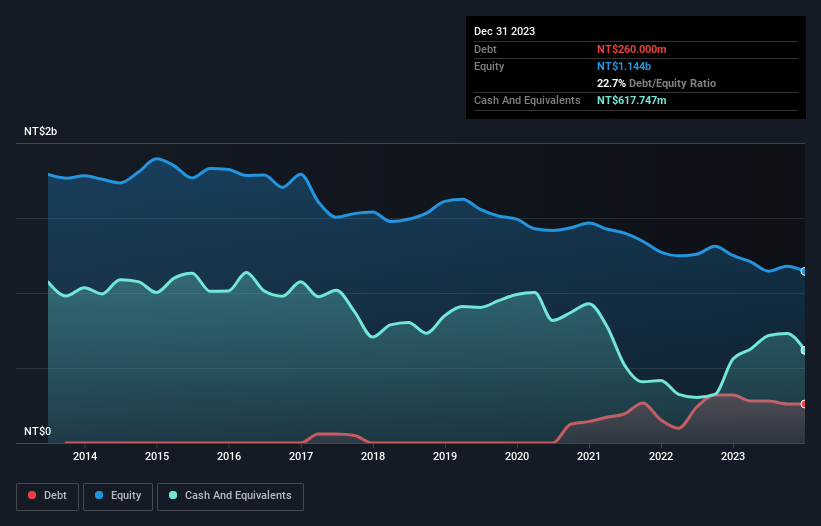- Taiwan
- /
- Electrical
- /
- TWSE:3296
Powertech Industrial (TWSE:3296) Has Debt But No Earnings; Should You Worry?

The external fund manager backed by Berkshire Hathaway's Charlie Munger, Li Lu, makes no bones about it when he says 'The biggest investment risk is not the volatility of prices, but whether you will suffer a permanent loss of capital.' So it might be obvious that you need to consider debt, when you think about how risky any given stock is, because too much debt can sink a company. Importantly, Powertech Industrial Co., Ltd. (TWSE:3296) does carry debt. But should shareholders be worried about its use of debt?
When Is Debt Dangerous?
Debt is a tool to help businesses grow, but if a business is incapable of paying off its lenders, then it exists at their mercy. Part and parcel of capitalism is the process of 'creative destruction' where failed businesses are mercilessly liquidated by their bankers. However, a more common (but still painful) scenario is that it has to raise new equity capital at a low price, thus permanently diluting shareholders. Of course, plenty of companies use debt to fund growth, without any negative consequences. The first thing to do when considering how much debt a business uses is to look at its cash and debt together.
See our latest analysis for Powertech Industrial
How Much Debt Does Powertech Industrial Carry?
The image below, which you can click on for greater detail, shows that Powertech Industrial had debt of NT$260.0m at the end of December 2023, a reduction from NT$320.0m over a year. However, it does have NT$617.7m in cash offsetting this, leading to net cash of NT$357.7m.

A Look At Powertech Industrial's Liabilities
Zooming in on the latest balance sheet data, we can see that Powertech Industrial had liabilities of NT$799.5m due within 12 months and liabilities of NT$171.5m due beyond that. Offsetting these obligations, it had cash of NT$617.7m as well as receivables valued at NT$436.0m due within 12 months. So it actually has NT$82.7m more liquid assets than total liabilities.
This surplus suggests that Powertech Industrial has a conservative balance sheet, and could probably eliminate its debt without much difficulty. Simply put, the fact that Powertech Industrial has more cash than debt is arguably a good indication that it can manage its debt safely. There's no doubt that we learn most about debt from the balance sheet. But it is Powertech Industrial's earnings that will influence how the balance sheet holds up in the future. So if you're keen to discover more about its earnings, it might be worth checking out this graph of its long term earnings trend.
Over 12 months, Powertech Industrial made a loss at the EBIT level, and saw its revenue drop to NT$1.5b, which is a fall of 42%. That makes us nervous, to say the least.
So How Risky Is Powertech Industrial?
While Powertech Industrial lost money on an earnings before interest and tax (EBIT) level, it actually generated positive free cash flow NT$179m. So taking that on face value, and considering the net cash situation, we don't think that the stock is too risky in the near term. We'll feel more comfortable with the stock once EBIT is positive, given the lacklustre revenue growth. When analysing debt levels, the balance sheet is the obvious place to start. But ultimately, every company can contain risks that exist outside of the balance sheet. To that end, you should learn about the 3 warning signs we've spotted with Powertech Industrial (including 1 which doesn't sit too well with us) .
When all is said and done, sometimes its easier to focus on companies that don't even need debt. Readers can access a list of growth stocks with zero net debt 100% free, right now.
If you're looking to trade Powertech Industrial, open an account with the lowest-cost platform trusted by professionals, Interactive Brokers.
With clients in over 200 countries and territories, and access to 160 markets, IBKR lets you trade stocks, options, futures, forex, bonds and funds from a single integrated account.
Enjoy no hidden fees, no account minimums, and FX conversion rates as low as 0.03%, far better than what most brokers offer.
Sponsored ContentNew: Manage All Your Stock Portfolios in One Place
We've created the ultimate portfolio companion for stock investors, and it's free.
• Connect an unlimited number of Portfolios and see your total in one currency
• Be alerted to new Warning Signs or Risks via email or mobile
• Track the Fair Value of your stocks
Have feedback on this article? Concerned about the content? Get in touch with us directly. Alternatively, email editorial-team (at) simplywallst.com.
This article by Simply Wall St is general in nature. We provide commentary based on historical data and analyst forecasts only using an unbiased methodology and our articles are not intended to be financial advice. It does not constitute a recommendation to buy or sell any stock, and does not take account of your objectives, or your financial situation. We aim to bring you long-term focused analysis driven by fundamental data. Note that our analysis may not factor in the latest price-sensitive company announcements or qualitative material. Simply Wall St has no position in any stocks mentioned.
About TWSE:3296
Powertech Industrial
Powertech Industrial Co., Ltd., together with its subsidiaries, manufacture and sell electronic circuit power protection and smart home wireless remote control devices, wired and wireless communication equipment, and electronic modules and parts.
Excellent balance sheet low.
Market Insights
Community Narratives




